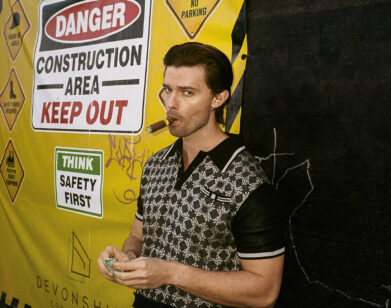Alejandro González Iñárritu
There is no way I could have done such intense dramas without some tools to survive them . . . The only way to get deep is to have a balance, or a counterbalance. Alejandro González Iñárritu
Spending time with Mexican-born writer and director Alejandro González Iñárritu, you’d never guess that he’s the filmmaker behind a series of movies known as the Death Trilogy. The way he dotes on his children and talks about his wife makes it clear that he has a crackling passion for life. In his work, though, this bounding energy comes through in subtler ways. Iñárritu’s films focus on the repercussions of a single act that draws people together and simultaneously throws their lives into chaos. In his feature debut, 2000’s Amores Perros (the first installment of that so-called trilogy), it is the left hand of fate cutting across economic and social lines as it moves through the populace of Mexico City. In 2003’s 21 Grams, an auto accident becomes a misfortune that both draws families together and tears them apart. In his 2006 epic Babel, it’s a butterfly effect that sets off ripples of misery across the planet. And in his 2010 film Biutiful, a single dad (Javier Bardem) struggles to scrounge a living for his children in the squalid margins of Barcelona.
Bardem was nominated for the Academy Award for Best Actor for his performance in Biutiful, and Iñárritu’s famed drive to seek the best from his actors has also resulted in Oscar acting nominations for Naomi Watts and Benicio Del Toro (21 Grams), and for Adriana Barraza and Rinko Kikuchi (Babel). Iñárritu’s own nomination for Best Director for Babel was the first such honor for a Mexican director.
In his newest film, Birdman or (The Unexpected Virtue of Ignorance), out this month, Iñárritu investigates stardom’s impact on a troubled actor. Riggan Thompson (Michael Keaton), who is best known for his long-ago reign as a costumed action hero—the titular character of the film—is wrestling with the existential echoes of having taken on such a defining role. Riggan is mounting an adaptation of Raymond Carver’s corrosive story “What We Talk About When We Talk About Love” on Broadway, and his mounting doubts about his life and the play are compounded by the others in his orbit, including his nihilist daughter (Emma Stone) and one of his co-stars, the dangerously self-absorbed and wildly talented Mike Shiner (Edward Norton).
I called Iñárritu in Calgary, where he was preparing to shoot a new film, his long-gestating Western The Revenant, which stars Leonardo DiCaprio, to talk about Birdman, Michael Jackson, and the labyrinths of the mind.
ELVIS MITCHELL: Hola, papi. Congratulations on the film. Tell me, why the alternate title for Birdman, The Unexpected Virtue of Ignorance?
ALEJANDRO GONZÁLEZ IÑÁRRITU: I have always said that innocence is much more powerful than experience. And, in some cases, people who suddenly fall into circumstances can unexpectedly bring some virtue to them—that’s kind of the case with this character.
MITCHELL: What made you want to deal with the Raymond Carver story “What We Talk About When We Talk About Love”?
IÑÁRRITU: It was a terrible idea. [laughs] I’ve loved Carver since I was very young. He’s one of my favorite writers. But I think to try to adapt a short story of Carver’s was suicidal. It’s exactly related to your first question: If you don’t know what you are dealing with, it’s an easy and good-bad idea to adapt Carver for Broadway. The film starts with an excerpt from this beautiful poem [“Late Fragment”] that Carver wrote just before he died, about what we are looking for in our life. He died when he was 50 years old, and the only thing he was looking for was to feel loved. I think that’s exactly the same for me. And the short story is about people lost and confused and looking for love. So in a way, thematically, the short story and the quest of Riggan Thomson are completely attached. I wanted the play itself to become a projection of him, and little by little, he would become one of the characters of that play. It’s a mirror of his own life.
MITCHELL: It sounds like you’ve basically done an adaptation of A Confession by Tolstoy.
IÑÁRRITU: Carver was supposedly reading Tolstoy’s Confession before he died. And A Confession was written when Tolstoy was at the peak of his career, at basically the same age as Carver was, and going through an intense crisis. He was the most famous writer, and was at the brink of suicide. He was rich, but he didn’t feel any meaning. It’s about the meaning of life, and it’s funny that both these great writers went though the same crisis at the same age. I love Tolstoy and I love Carver. I just turned 51, and I went through the same kind of crisis: What the fuck is life about? What is the meaning? In a way, you get into a melancholic state. And I think the Carver poem could encapsulate everybody’s life. We are all looking for the same thing, affection. That’s what our character was questioning. His ex-wife said to him, “You’re always confusing love for admiration.” And that’s a very dangerous thing that most of us human beings have done.
MITCHELL: The third part of Amores Perros is about a man asking himself, “What will come of my life?” Which is the question that A Confession asks. And Sean [Penn]’s character in 21 Grams is asking the same question. You could even say the same thing about Javier’s character in Biutiful. They’re all asking, “What’s going to become of me?”
IÑÁRRITU: I’m telling the same story in every film.
MITCHELL: [laughs] That’s not what I’m saying! Do you remember where you were when Michael Jackson and Farrah Fawcett died? We were in Korea together when that happened. Michael Jackson was about the same age as Carver and you—50 years old—at a point when Carver, and maybe Michael Jackson, and certainly Riggan, can see the end of the tunnel.
IÑÁRRITU: You can come through or not, depending on how dark the cloud is. But I think there’s a time when things that used to satisfy you or you thought were important, you realize are not important. Time is running out, the party lights are blinking, there is no more ice in the bucket. And you begin to realize the party will finish very soon in some way or the other. In A Confession, Tolstoy found meaning that he could hold on to, and he lived for another 30 years.
MITCHELL: Tolstoy, Carver, Jackson, and Riggan—these are people who are dealing with incredible financial success. In a lot of ways, they should have been satisfied, and they just weren’t.
IÑÁRRITU: That’s what I want to explore. And I hope that the film, in a way, explores it. There is this apocalyptic urgency that has been treated with irony for years, and I try to stay away from irony, which I personally don’t like. Irony is a great tool to deal with things. It’s an intellectualization, a way to go above things, which can work. But I think that, in the last 50 years, pop culture has been a victim of an excess of irony, and anything earnest or truthful or emotional isn’t cool anymore. Every institution has collapsed. And if there’s nothing, if everybody agrees that the way to approach it is with a degree of irony, there is nothing else. I’m seeing this in my kids. They consume such an amount of irony that nothing is really worth it. Irony became the head that bit its tail and then there is no way out. So, I prefer humor to reconcile with the things that are wrong, the trials of life. When you see things upside down, the ego can be extraordinarily funny; it’s absurd. But it’s tragic at the same time.
MITCHELL: If you go all the way, 180 degrees from melodrama, it’s comedy, where things are so absurd and so painful you laugh.
IÑÁRRITU: If you stretch tragedy, it will always become comedy. That’s the comedy that I like. And I always thought about Riggan Thomson as a Don Quixote of La Mancha, where humor comes from the disparity between his solemn, furious attempts and ambitions to become a serious artist and the ungovernable reality that is contrary to his wishes. That’s basically the story of every human being, including me. It’s hard to deal with our mediocrity, I think.
MITCHELL: [laughs] Whenever I talk about the tragedy that runs through your work, I say, “But he’s somebody who loves to laugh. Every time we sit down to have a meal, we’re laughing all the time.”
IÑÁRRITU: There is no way I could have done such intense dramas without some tools to survive them. It’s famous that comedians have a very dark personal state of mind. I think, in my case, it’s the same. The only way to get deep is to have a balance, or a counterbalance.
MITCHELL: You have such a love of life. And the movies you make so often flirt with death, or the possibility of death.
IÑÁRRITU: I hate the idea of dying, though. I guess spiritual growth is to be liberated from that fear, to stop rebelling against something that is absolutely medical, the only sure thing for all of us, but that idea really can be extraordinarily painful.
MITCHELL: For this character, it’s a different kind of death, the death of his dream.
IÑÁRRITU: It is an artist’s obsession to transcend time, right? I know, on a personal level, that all our self-important conceptions of ourselves—that our art will transcend time—is a childish illusion. Our participation in reality is just a little flash that means nothing to the cosmic reality of time. That’s why the character, Sam, played by Emma Stone, brings that roll of toilet paper with all the stripes to show what we as a race mean against the age of the planet Earth. That comes from a personal experience that I had with my daughter. They gave that exercise to my daughter in her theology class. And it’s beautiful to understand that you are relieved of any responsibilities; to think in terms of eternity liberates you from your self-obsessions. But at the same time, it can be very hard. So I think Riggan’s quest, trying to really transcend and mean something, while he’s confronted by different characters and his own ego telling him, “You are worth nothing,” is really hard.
MITCHELL: Talking about transcendence, the very last shot in the movie is a pretty brave thing to include.
IÑÁRRITU: It came to me in the middle of the shooting. The script was not like that at all; the ending was absolutely different. But I thought that it was unfair to finish the way it was. It was not honest; it was not right. My writing partners and I looked into it. And the idea came to me early in the morning, after I had a dream. I said, “Fuck, this is it, this is the way I want it.”
MITCHELL: You dreamed the ending?
IÑÁRRITU: Yes, it just came in a dream. And when I woke up, I knew that I had it. I hope people can feel attached to the emotion that the character feels. There can obviously be so many endings, but I’m glad about this one. I like it.
MITCHELL: Have you ever changed the ending of a movie as you were working on it before?
IÑÁRRITU: No, not as radically. I changed things, but this was a radical move.
MITCHELL: What did Michael [Keaton] think of that ending when you told him about it?
IÑÁRRITU: He loved it. Suddenly his perception of his own character changed. It helped him a lot to understand who this guy was. And he nailed it.
MITCHELL: With Keaton and Emma Stone and Zach Galifianakis, you had these actors who were mostly known for comedy.
IÑÁRRITU: I wanted to have people who can be honest, but at the same time be perceived as likable people—people who bring lightness and likeness. I tried to measure the energies, and between the intensity of Edward Norton, and Emma, and Zach, I was trying to combine energies to get the tone I wanted. I wanted to make a melting pot of energies and possibilities.
MITCHELL: So much of the movie takes place inside. There’s a kind of tension that comes just in keeping people caged up in the theater all the time.
IÑÁRRITU: I want people to experience what it feels like to be trapped in the labyrinthine corridors of a real Broadway theater built 87 years ago. They really are that tiny and claustrophobic. [Riggan] is trapped for three days before the opening night, and I wanted people really to feel trapped with him—you can’t escape from the commitment he has.
MITCHELL: When did it occur to you to make it all feel like one continuous shot?
IÑÁRRITU: When I conceived it, I knew the form of it. I had a discussion with Walter Murch, the editor, about whether our life is experienced as a handheld [shot], or if it’s experienced as Steadicam, the fluidity of it. And I realized that, at 50 years old, our life, everybody’s lives, is a continuous Steadicam shot. From the time we open our eyes in the morning, we are navigating our lives without editing. Only when there’s urgency are we in hand held mode. Editing time and space comes only when we talk about our life, or the way we remember our life. I wanted to slowly put myself in the continuous experience of somebody else without escaping. And Walter Murch told me something very interesting. He said that there’s a phenomenon that, as the eye moves from A to B, it skips over a gap in information. Your brain fills that lack of information. There is an edit, but it fills it with memory.
MITCHELL: John Huston used to say that each blink of the eye was like a cut. And you could keep a shot going for as long as a person could keep their eyes open before they blink.
IÑÁRRITU: That’s exactly what Walker Murch was defending. But that’s a long argument.
MITCHELL: [laughs] This is really an ensemble piece for you.
IÑÁRRITU: Absolutely. I always thought that Riggan, Michael Keaton, was the sun, and all the other characters were the planets going around him.
MITCHELL: What was it about Keaton?
IÑÁRRITU: Honestly, when I finished the script, I knew that he was the guy. I liked the authority that he has to really talk about it, about superheroes—he’s the pioneer. And how many people have worn that cape of the global film superhero? He brings that meta-dialogue between the film and the reality. But, beyond that, I needed a very gifted actor of that age who could navigate from comedy to drama, seamlessly, somebody who was really likeable. So Michael became the guy that I needed to convince.
MITCHELL: He’s a very intense actor as well. I think you like pretty intense actors.
IÑÁRRITU: Absolutely. I had a lunch in Mexico with Tim Burton, and I said to him, “Why did you cast Michael for Batman [1989]?” He said, “Besides all the comedy fame and craft that he has, he’s a very smart, intense man, and you can see that in his eyes.” He can be likeable, loveable, funny, light, but if he wants to, he can turn into somebody else in a second. And, honestly, I’ve worked with great actors, but never have I seen a guy transitioning from funny to a little weird, to a little cuckoo, to intense, to very emotional, and back to crazy again—this whole palette of things—with precise marks, and meticulously rehearsed movements that make them feel absolutely seamless and beautiful and human. I was really surprised about him. He was incredible.
MITCHELL: I wonder how he came through it, because you demand a lot of your actors. I remember talking to somebody once who said, “Oh my God, I love Alejandro … but that was hard.”
IÑÁRRITU: [laughs] I have a bad reputation, I guess. But I am doing it for the right reasons. I always know what the character needs. And it’s scary sometimes for actors or actresses, but I try to help them to use the fear to get there. And the only thing that I demand is what I have them demanding of me, which is absolute honesty. It doesn’t matter if it’s good or bad, but if you’re not truthful, you can’t be there. That’s the only responsibility of an artist. In this case, I gave every actor a photograph of Philippe Petit crossing between the Twin Towers on a high wire, and I said, “We are doing that. I will not be able to hide your performances. I will not be able to hide my mistakes. I will not be able to fake anything. I will not be able to polish or manipulate or even break space and time. I am as fucked as you are, and everybody will be holding hands. We will be a bunch of elephants crossing the fucking Twin Towers on a cable. Good luck.” And it was like that. And I would do it again tomorrow.
ELVIS MITCHELL IS INTERVIEW‘S SPECIAL CORRESPONDENT.







